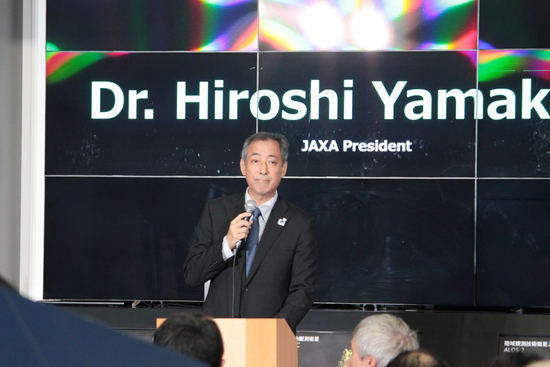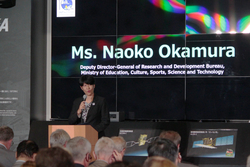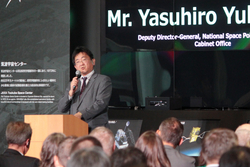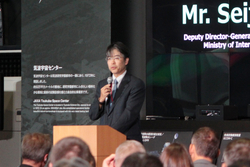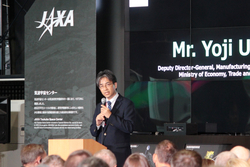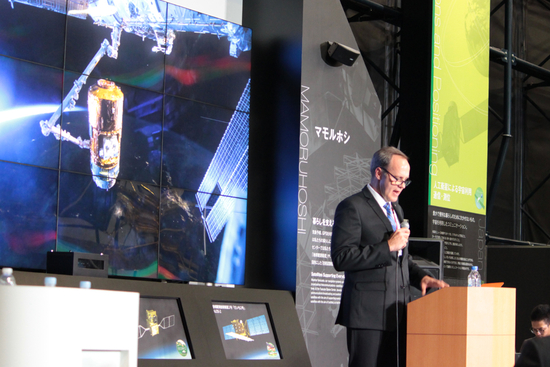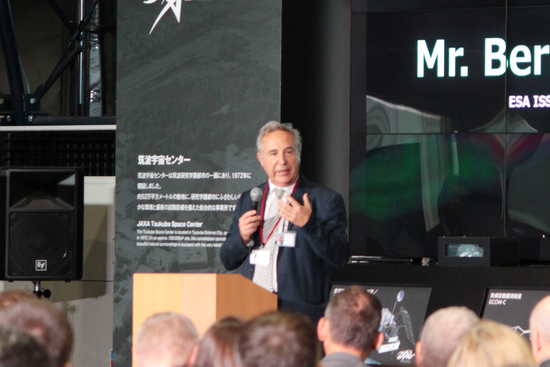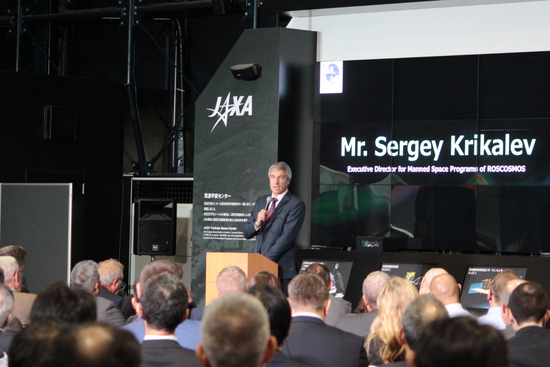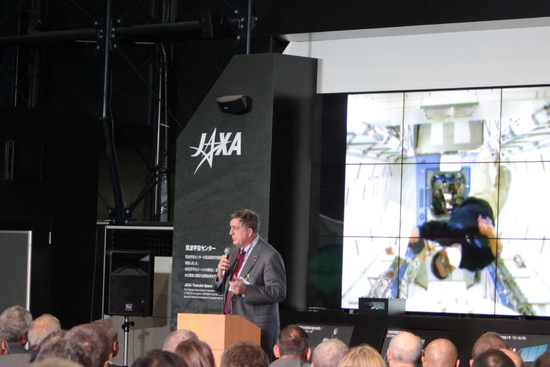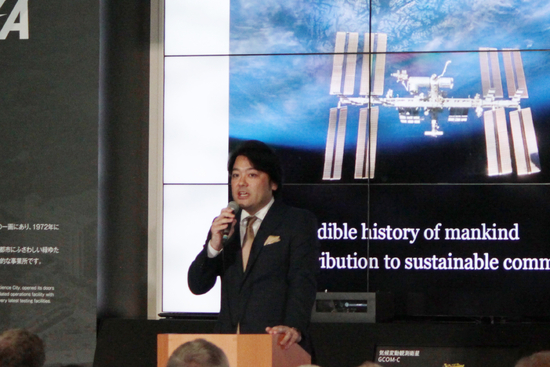This is an archive of information released in the past.
Disclaimer: It may contain broken links or outdated information. Some parts may not function in current web browsers.
*Visit https://humans-in-space.jaxa.jp/en/ for the latest information.

TOPICS
10th Anniversary Event for the KIBO and KOUNOTORI
On September 2 2019, a 10th anniversary event for the Kibo and KOUNOTORI was held at the exhibition hall Space Dome in JAXA's Tsukuba Space Center (Tsukuba, Ibaraki). Space Dome was bustled with many of those who have worked on development and operation of the Kibo and KOUNOTORI, guests from within and outside Japan, and people from media. The event was carried out in a genial mood where they caught up with old friends and laughed at the speeches with jokes by the speakers on the podium.
Opening Speech
Under the masters of ceremonies, Takuya Onishi (Astronaut) and Sayaka Umemura (Associate Senior Engineer at the JEM Utilization Center, Human Spaceflight Technology Directorate, JAXA), President of Japan Aerospace Exploration Agency (JAXA), Hiroshi Yamakawa made a speech to the guests from within and outside Japan who have worked on the development and operation of the International Space Station (ISS) regarding the 10th anniversary of the Kibo and KOUNOTORI, and reviewed the outcomes through the operation and utilization of the Kibo, and touched on the future of the ISS.
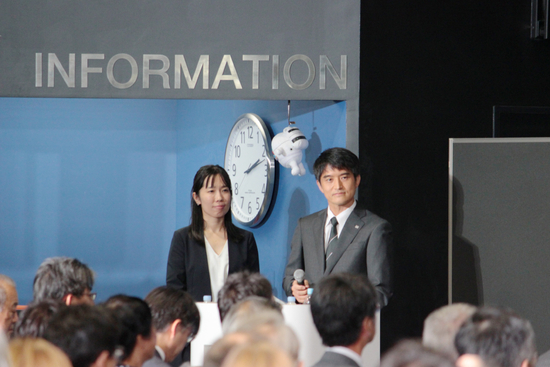
Masters of ceremonies, Sayaka Umemura, Associate Senior Engineer (left) and Takuya Onishi, Astronaut (right) (Credit: JAXA)
Guests Speeches
Naoko Okamura, Deputy Director-General of Research and Development Bureau, Ministry of Education, Culture, Sports, Science and Technology
She spoke about how the ISS plan is a vanguard of large-scale international cooperation in the fields of science and technology in Japan, and that accumulated knowledge and lessons learned by overcoming technical and political challenges would be utilized not only in space but also in other fields and activities. She also addressed her hopes in the next 10 years, that human spaceflight activities on the ISS and low Earth orbit would not just acquire new knowledge, but also drive the industry to be more independent and develop their businesses on their own.
Yasuhiro Yukimatsu, Deputy Director-General, National Space Policy Secretariat, Cabinet Office
He spoke about the ISS being a symbol of peaceful utilization, how the activities of the ISS astronauts have nurtured dreams of the youth, and that the National Space Policy Secretariat would be part of driving the ISS projects along with the international partners. He also mentioned that it has been five years since the Basic Plan on Space Policy was established and during the five years, huge changes and progress have happened in the field of space utilization such as joining of venture businesses, increased momentum towards lunar and Mars exploration through international cooperation, and that because of this, they have opened a discussion regarding revising the Plan.
Seiji Ninomiya, Deputy Director-General for ICT R&D and Cybersecurity Policy, Ministry of Internal Affairs and Communications
He spoke about the National Institute of Information and Communications Technology's (NICT) research and development of remote sensing technology for atmospheric observation on-board Kibo and activities on communication testing using the Small Optical Link for ISS (SOLISS) carried by KOUNOTORI8.
Yoji Ueda Deputy Director-General, Manufacturing Industries Bureau, Ministry of Economy, Trade and Industry
He spoke about how the ISS has been playing an important role in the space industry, and also cited their Hyperspectral Imager SUIte (HISUI) as an example, which is planned to be launched later this year to start observation while on Kibo's Exposed Facility, stating that the Ministry of Economy, Trade and Industry is proactively pushing forward the utilization of the Kibo.
Congratulatory Message from the Crew in Space
A congratulatory message from the Expedition 60 crew was introduced. The crew mentioned that through achievements related to the Kibo and KOUNOTORI, Japan has showed that Japan is one of the very important partners, that the Kibo has brought large benefits to our society via science and technology, and that the KOUNOTORI is an imperative lifeline for securing safety and successful utilization of the ISS. The crew also expressed their appreciation for Japan's contribution to the ISS for the past 10 years and hoped for the future success.
Introduction of the Results Produced by the Kibo and KOUNOTORI
Fumiya Tsutsui (JAXA ISS Program Manager) and Hirohiko Uematsu (JAXA HTV Technology Center Director) reviewed the three space shuttle flights that lead to the completion of the Kibo in 2009, and its advancements over the years defining it as an essential foundation to support various space environment utilization both in-board and out-board.
Through a video, they also introduced various experiments such as protein crystal growth, mouse habitation missions and space medicine that took place on the Kibo, which contributed to our terrestrial society, as well as the KOUNOTORI playing an important role in transporting supplies imperative for utilization and operation of the ISS as a critical lifeline.
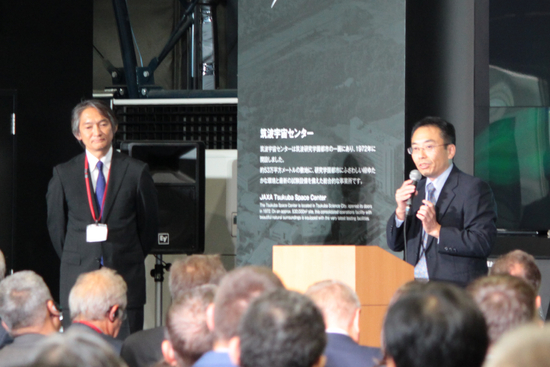
Hirohiko Uematsu, HTV Technology Center Director (left)
and Fumiya Tsutsui, ISS Program Manager (Credit: JAXA)
Speeches by the Representatives of the ISS Major Relevant Organizations
Canadian Space Agency (CSA)
Ken Podwalski (Gateway Program Director, CSA) spoke about memories with JAXA colleagues whom he worked together with. As such, he mentioned the joint launch of the Special Purpose Dextrous Manipulator (Dextre) and Kibo in 2008 and their journey until now. He also introduced an episode of when Robert Thirsk, the first long-term stay crew (Expedition 20/21) from Canada, operated the first KOUNOTORI and the astronaut said that the KOUNOTORI is indeed a gift that transports various supplies to the ISS.
European Space Agency (ESA)
Bernardo Patti (ESA ISS Program Manager) mentioned that there have been crises both financially and human resource wise, but that they have overcome these challenges by uniting together and with leadership of each country. He also mentioned ESA's vision to promote space commercialization and to expand human activities beyond low Earth orbit.
State Space Corporation (ROSCOSMOS)
Sergey Krikalev (Executive Director for Manned Space Programs of ROSCOSMOS) congratulated the assembly of the ISS as well as the attachment of the Columbus (Europe's laboratory module) and the Kibo to the ISS among a series of achievements. He mentioned that with the Kibo attached to the ISS, there has been a substantial increase in opportunities for experiments. He also spoke about the new challenges to face after 20 years of service of the ISS, but also indicated that it is important to continue ISS and move forward toward the future.
National Aeronautics and Space Administration (NASA)
Kirk Shireman (NASA ISS Program Manager) introduced important functions of the ISS and Kibo using video and slides, and spoke about how important international cooperation is for the success of the missions while recalling the space shuttle missions and the launch of the first KOUNOTORI. He also mentioned that he was impressed by the images of the Marangoni convection experiment, which was the first experiment on the Kibo.
Keynote "Pursuing Space Industrialization"
Masatoshi Nagasaki (Co-Founder & CEO, Space BD Inc.), who works on the business associated with deployment of ultra-small satellites from the Kibo, gave a keynote. He mentioned that his company has supported the deployment of many satellites with the cooperation of JAXA and universities, and he concluded by expressing his enthusiasm towards the promotion of continued efforts on industrialization and bringing in more private sectors to the space industry.
Panel Discussion "Future Needs for Low Earth Orbit (LEO) Exploration"
Moderators:
Panelists:
|
By Ishida's moderation, a panel discussion that consists of three themes regarding the future needs for low Earth orbit exploration was held.
Tech Technology and Human resource development for exploration
Services for on-orbit assets
Under the above two themes, it was pointed out that for the future lunar and Mars exploration, experiments that simulate the 1/6 of Earth's gravity, which is the same as the moon, have already been conducted on the ISS, and that this is considered to be an important step to move forward. In the microgravity research field, they discussed the necessity of increasing the users' demand by having a system so that users can get the results easily just like online shopping and raising scientific value through creation of high-quality crystals, etc.
For the future demand, opinions were exchanged on gained return, transportation cost and securing opportunities, sample sharing systems, financial support for private businesses, how to hand over what has been gained from the ISS, etc.
Tourism and Shelter
They expect that the future market scale for space travel will be large, so they discussed the movement towards creation of commercial habitat.
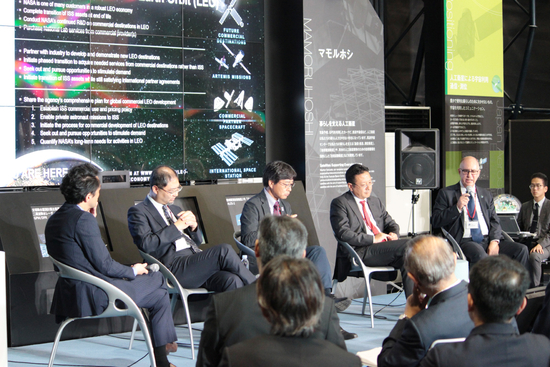
Panelists who actively exchange opinions
(from left to right, Mr. Ishida, Mr. Sato, Mr. Takahashi, Mr. Oyama, Mr. Scimemi) (Credit: JAXA)
Closing Speech
Dr. Koichi Wakata (JAXA Vice President) gave a closing speech, referring today as the new beginning and calling for continuous safe operation of the ISS, maximizing utilization outcomes, and to take the challenge together to leverage activities in low Earth orbit.
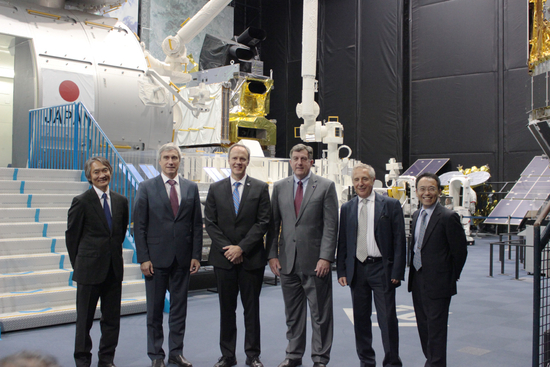
Taking a commemorative photo at the end with all representatives of the ISS major relevant organizations (Credit: JAXA)
| Copyright 2007 Japan Aerospace Exploration Agency | Site Policy |
